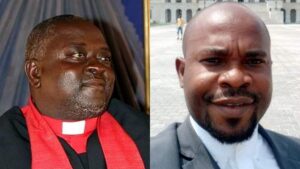The United Methodist Church (UMC), one of the largest mainline Protestant denominations, is entangled in internal conflict over same-sex marriage and the ordination of Lesbians, Gay, Bisexual and Transgender (LGBT) clerics. At the February 2019 general conference of the church in the USA, the leaders rejected moves to remove restrictions on LGBT clerics and same-sex marriages.

Instead, delegates from across the world voted 438 to 384 to pass what was called the Traditional Plan, which maintains the church’s rules. As the church prepares for the next general conference in 2022, centrists and liberals who favour LGBT inclusion are in conflict over the issue.
The conflict has also affected the unity of the church in Nigeria, whose headquarters is in Jalingo, Taraba State. While the head of the church in Nigeria believes the conflict is behind the crisis in the Nigerian branch, others locate the cause elsewhere
In this report, our reporter, Chuwang Dungs, listens to the Bishop of the UMC in Nigeria, John Wesley, and his former administrative assistant, Emmanuel Ande, who is a leader of a group opposed to the leadership of the bishop, as they make their cases.
On the background to the dispute over the gay issue and its effect on the church in Nigeria?
Wesley: For many years the LGBT community has been advocating for acceptance in the United Methodist Church, but the church has objected to that. In each of the annual general conferences, it has always been ruled that the practice of homosexuality is incompatible with the practice of Christianity. In 2016 when they were defeated, there was an uproar among the LGBT community. They came into the session of the general conference and disrupted the proceedings, forcing the presiding officer to stop at a certain point. We had to move out of the venue because they were rioting and protesting. Because of that, we calmed the situation by promising to look into the matter.
In 2019, a special session was called and the Council of Bishops set-up a 32 member committee which it called the Commission on Way Forward. There were LGBT community members and different interest groups in the commission. To the honour of God, the Council of Bishops nominated me as a member of the commission. We had a series of meetings in the U.S. and came out with a report and presented it at the special session. But in that special session again, all the plans to include the homosexuals or the progressives were defeated.
The United Methodist Church upheld that homosexuality is incompatible with Biblical teachings and I also share the same position. Looking at Genesis chapter 2, a man was created and God felt he needed a suitor and he created a woman for him; not a fellow man. That has been my position.
In 2014, I was granted the opportunity to present a message in the U.S.during a meeting of the Council of Bishops. In that message, I preached about love because the argument by the homosexuals is that they are not being loved. So in the message I cited that the concept of love is like a flowing water, flowing in a room causing a lot of mess. I said that is what I saw in the United Methodist Church. So when I finished the message, some homosexuals or progressives asked why I should say that. They raised questions and I gave them answers with Biblical backing.